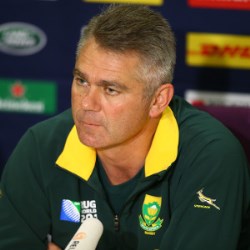
Heyneke Meyer
His body language on match day is so often a dead giveaway, and Heyneke Meyer is the 1st to admit that he “stresses”.
So don’t expect the Springbok coach to be getting the best sleeps of his life in the build-up to Saturday’s Rugby World Cup quarterfinal against Wales at Twickenham (17:00 SA Time).
After all, he is facing arguably the most pivotal, “crossroads” game of his coaching career, when you think about it.
Not even the achievement of making the Bulls the 1st South African franchise to win Super Rugby in its properly pro-era incarnation in 2007 can be considered to rank as high in gravitas as this maiden knockout fixture at a Rugby World Cup for the very recently-turned 48-year-old from the Lowveld.
Unlike predecessor Peter de Villiers in 2009, Meyer has not had the opportunity to steer the Springboks through what might be considered next in line for heavyweight status after Rugby World Cup, a visit to our shores by the British & Irish Lions (next tour only due in 2021).
His tenure since 2012 has not yet brought the fruit of a Rugby Championship success, although he does warrant great credit for overseeing successive sweeps of European end-of-year tours in both 2012 and 2013, at a time of season when South African players are seriously vulnerable to fatigue.
Considering the unexpected degree of turbulence in the Springbok results column during the current season (including that Rugby World Cup-opening Japan shocker), reaching the semifinals of this tournament, all things considered, can probably be deemed as just about a “par” achievement for Meyer in his 1st exposure to a Rugby World Cup.
I would also suggest it is the minimum requirement from a public and, to a strong extent, punditry point of view if there are to be reasonably widespread acceptance levels over his reportedly on-the-table contract extension with the national team to 2019.
Expect a tidal wave of indignation and rebellion – simultaneously signalling or at least hastening Meyer’s demise? – if the Springboks, widely installed as favourites to topple the Welsh and still holders of huge 27 to 2 historical supremacy in bilateral wins terms, are instead swiftly shepherded onto a flight home.
Just by advancing to the last 4 – and particularly if they can slay the dragon with some ease and efficiency – I would imagine Meyer will earn far greater approval, in the public eye, for reported plans for him to build on his vision for Springbok rugby.
Remember that reaching the semis also tees up an opportunity to play in what is now branded the “bronze final”, the playoff for 3rd spot and at least the recognition that you “made it to the podium” at the event.
That match is still regarded as possibly unnecessary, hangover-type drudgery by some critics, but South Africa won it – against the All Blacks, which helped – at the 1999 tournament when Nick Mallett had the reins and the team were able to return to an overwhelmingly good reception from domestic enthusiasts.
Should the Springboks crash out on Saturday, expect vast sections of their following to quickly overlook the comeback strides the team have since made in restoration of dignity and playing quality after the Japanese embarrassment.
In short, they will demand Meyer’s head. Nothing less.
A mood may amass which renders null and void the tenacious support the coach is believed to enjoy in the boardrooms at SARU.
The fact that I might find myself, under such circumstances, a voice in a relative wilderness in not automatically joining the baying masses (brutal, often knee-jerk change doesn’t always turn out for the better, and there is Meyer’s 1st-class track record for slow-brew success to consider) would be an irrelevance.
This meticulous, workaholic and highly passionate man has his faults and inconsistencies, for sure, but after stormy events in Brighton he does appear to crucially “have the dressing room” pretty much en masse once more and there are few reasons not to feel chipper as South Africans about Saturday’s hurdle.
His charges are back employing a template of rugby that isn’t always aesthetically pleasing – though even aesthetics are open to different interpretations, yes? – but seems generally well geared to knockout needs at a Rugby World Cup.
Even his sometimes critical immediate predecessor De Villiers – remember that his own last game in charge was a Rugby World Cup quarterfinal loss, in 2011 – effectively lauded Meyer on Tuesday in a column in The Times as he noted: “The Springboks have returned to their traditional ‘suffocate and strangle’ tactics, which once made them the fear of world rugby.
“It represents bad news for their quarterfinal opponents.”
Nor is it as though the Springboks are basing their energies solely on relentless mauling and bone-crunching hits: a tries-for tally of 23 (2nd only to New Zealand) in the pool phase serves as testimony to that, including the prosperity of veteran outside back Bryan Habana for diving visits to the whitewash.
All that said, this quarterfinal may yet prove a watershed rugby match for Meyer as Springbok coach.
If he gets legendarily fidgety at the best of times when match-day approaches, just imagine what the poor fellow’s going through right now…
(Sport24)
How the Springbok Locks stack up:
Springbok coach Heyneke Meyer has a few interesting selection posers ahead of his team’s World Cup quarterfinal showdown with Wales.
However the most intriguing selection perhaps – when he names his team on Wednesday, for Saturday’s encounter with the Welsh at Twickenham – is who will start in the locks?
If veteran lock Victor Matfield, a 2007 World Cup winner, makes a full recovery from injury, it will mean Meyer will have his full quota of locks to select from – a very pleasant headache.
According to reports from the team’s base at Pennyhill Park in Bagshot, Matfield, who missed the last 2 matches with a hamstring strain, did not take part in full training on Monday.
However, he was listed as ‘likely to be available for selection’ at a team media briefing earlier this week.
1 Of the key factors in South Africa’s comeback from an opening Round loss to Japan has been the form of the locks.
While most pundits see young guns Eben Etzebeth and Lodewyk de Jager as the perfect partnership, Meyer may well opt for the experience of 125 Test caps and 3 previous Rugby World Cups that Matfield brings.
Matfield started alongside De Jager in the opening match, with Etzebeth coming on as a 2nd-half replacement. Matfield then started alongside Etzebeth in the next match against Samoa, with De Jager coming off the bench after the beak.
Injury intervened and for the next 2 matches Etzebeth and De Jager were the starting locks – with another young gun, Pieter-Steph du Toit, coming off the bench late in the matches against Scotland and the United States (Du Toit was started at flank in the loss to Japan).
The Springbok camp was giving very little away ahead of Wednesday’s team announcement, with assistant coach John McFarland singing the praises of all the locks.
“Victor played the 1st 50-odd minutes against Samoa and he was really good,” McFarland said, when quizzed at a media briefing about a possible lock combination.
“The man on my left (Etzebeth) brings it as well.
“We have 2 great young locks and Victor sets the lead in terms of where we all aspire to – in terms of his workrate, in terms of the way he conducts himself and the way he plays.
“We are blessed to have, including Pieter-Steph du Toit, 4 great locks,” McFarland added.
Etzebeth was also not going to let the media into any selection secrets he may have.
“They are both great players,” he said, when asked about the attributes of Matfield and de Jager – who are presumably vying for the No 5 position.
“Victor has more caps, but on the field Lood brings it,” Etzebeth said.
“His defence is fantastic and he is a good ball-carrier.”
So, how do the Springbok locks stack up against each other?
Here’s a look at their Rugby World Cup statistics and it makes for some interesting reading!
Victor Matfield:
(Played 2 matches, made 18 tackles, has a 100% tackles success rate, had 6 carries for 25 metres)
Played 80 minutes (at lock) in the 32 / 34 loss to Japan
Played 54 minutes (at lock) in the 46 / 6 win over Samoa
Did not play in the 34 / 16 win over Scotland
Did not play in the 64 / 0 win over the United States
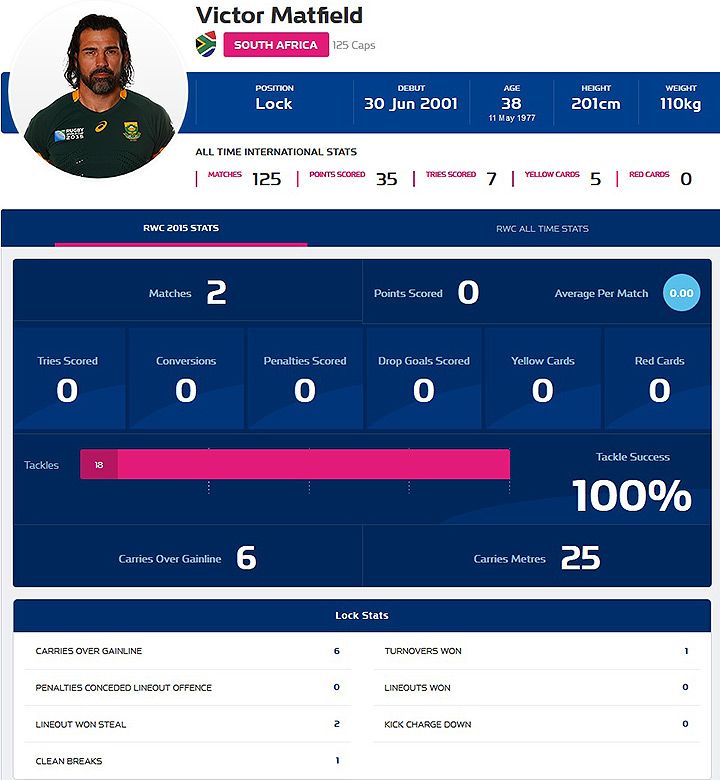
Lood de Jager:
(Played 4 matches, made 50 tackles, has a 98% tackle success rate, made 21 carries for 98 metres)
Played 68 minutes (at lock) in the 32 / 34 loss to Japan
Played 26 minutes (at lock) in the 46 / 6 win over Samoa
Played 75 minutes (at lock) in the 34 / 16 win over Scotland
Played 63 minutes (at lock) in the 64 / 0 win over the United States
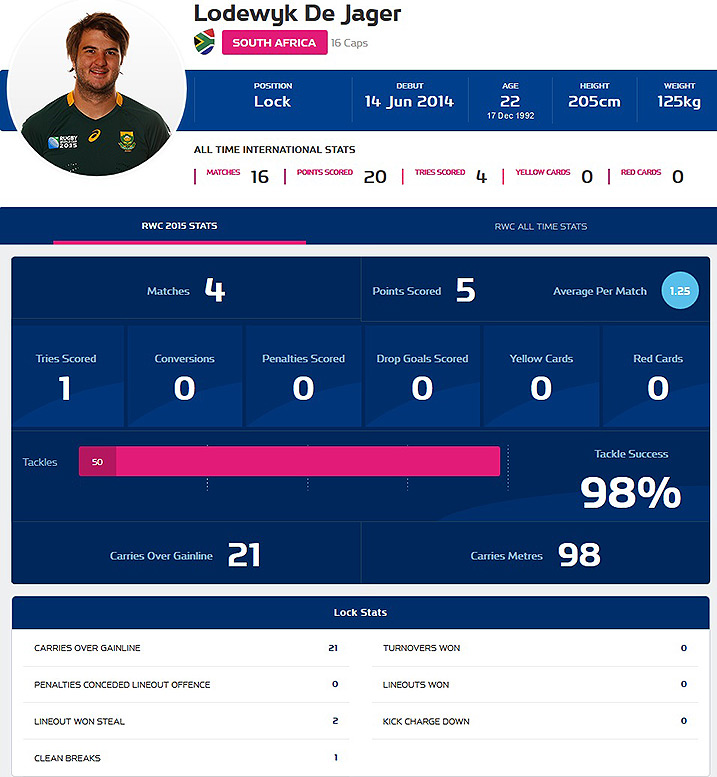
Eben Etzebeth:
(Played 4 matches, made 32 tackles, has a 97% tackle success rate, made 18 carries for 72 metres)
Played 12 minutes (at lock) in the 32 / 34 loss to Japan
Played 80 minutes (at lock) in the 46 / 6 win over Samoa
Played 80 minutes (at lock) in the 34 / 16 win over Scotland
Played 80 minutes (at lock) in the 64 / 0 win over the United States
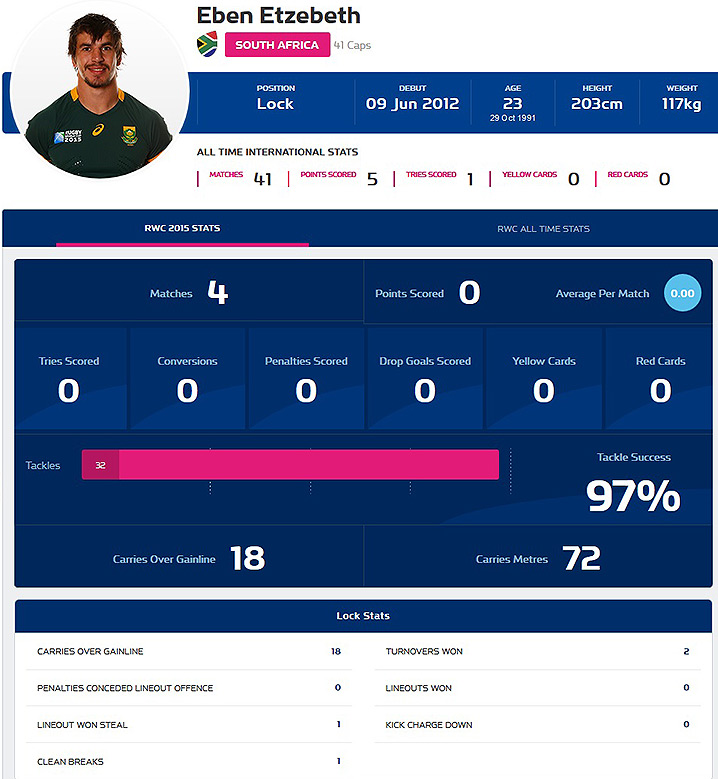
Pieter-Steph du Toit:
(Played 3 matches, made 11 tackles, has a 92% tackle success rate, made 4 carries for 10 metres)
Played 57 minutes (on the flank) in the 32 / 34 loss to Japan
Did not play in the 46 / 6 win over Samoa
Played 5 minutes (at lock) in the 34 / 16 win over Scotland
Played 17 minutes (at lock) in the 64 / 0 win over the United States
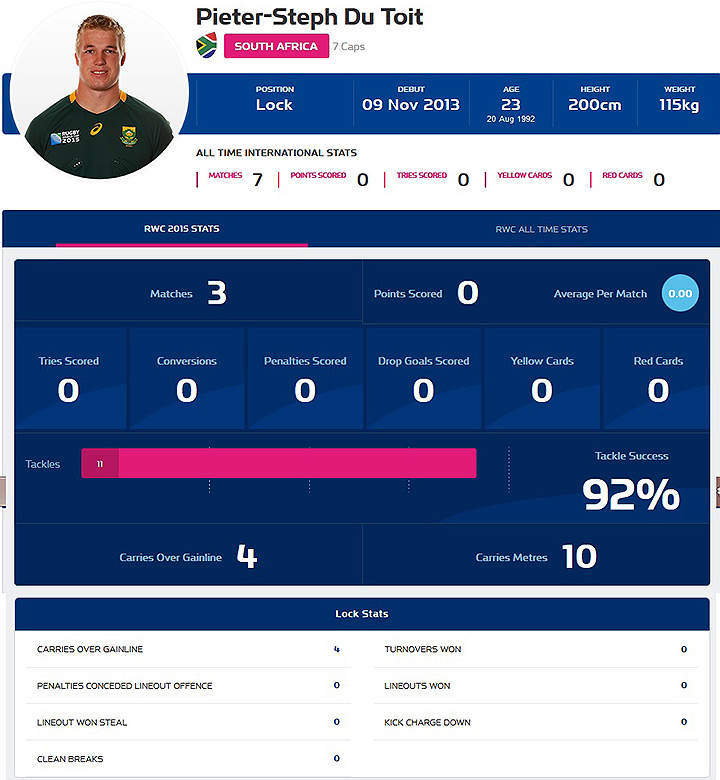
rugby365 & rugbyworldcup
Bok team to be announced at 11 o clock today not sure if that is UK time or SA time.